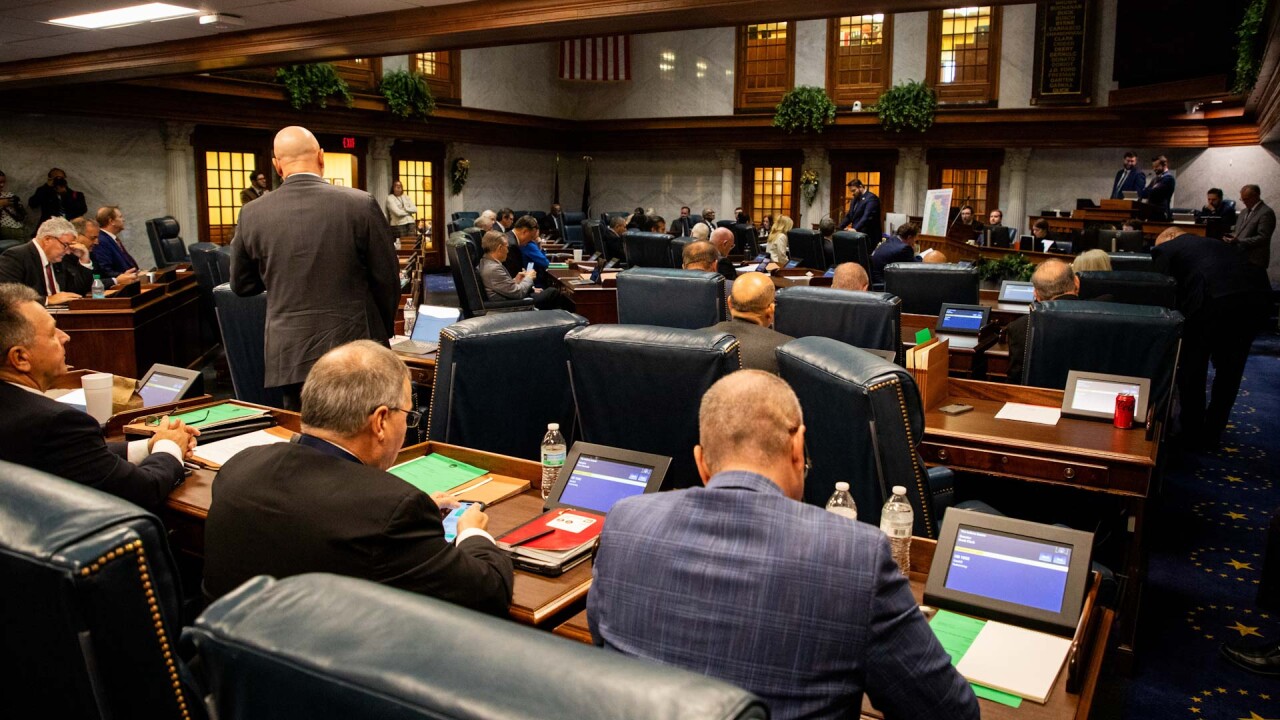
A new Indiana law promising property tax relief will make it harder for local governments and schools to issue bonds.
Indiana Gov. Mike Braun signed Senate Bill 1 on April 15. The
Schools are banned from adopting a resolution to issue bonds, enter into a lease or extend a referendum tax levy for one year after the last year in which the school's previously-approved project referendum tax levy applies.
"This [law] allows for a cooling off period before those general obligation bonds or capital improvement referenda can be renewed," state Sen. Travis Holdman, R-Markle, the majority caucus chair and lead author of SB 1, told The Bond Buyer. "One year, which gives the taxpayer an opportunity to see a difference in their tax rate."
The new bond rules are part of a larger package of local tax changes that backers say will cut $1.3 billion from property tax bills over three years.
Taxpayers will save directly through property tax credits and higher homestead exemptions,
Holdman said. Businesses will see an increase in the business personal property tax exemption.
Holdman noted that the legislature also tightened the rules around public hearings required for levy raising.
"I had two school corporations in my district that last fall had two public hearings and rolled their debt over and not one person showed up at the public hearings, mostly because we think they didn't know about it or didn't know what was going on," he said.
Indiana local governments have about $54 billion of outstanding debt, Holdman said.
Local governments need to borrow regularly for infrastructure and capital projects, and this law could hamstring them, said Andrey Yushkov, senior policy analyst at the Tax Foundation, a Washington, D.C.-based think tank that studies tax policy in the U.S.
"If their ability to issue bonds is restricted, or own-source revenues decline considerably, there will inevitably be effects from the markets in the form of lower credit ratings, higher borrowing costs, and fewer buyers willing to purchase those bonds," he said.
Democrats voiced concerns about the effects of the law, both on taxpayers and on schools and local governments.
"SB 1 puts our local officials in a serious bind," said state Rep. Gregory Porter, D-Indianapolis.
"Local governments will be further constrained when it comes to financing their projects," he said. "This is a shame since Indiana constantly celebrates our AAA bond rating. Now, our local governments will fail to truly benefit from our rating."
In
"[This law] will add another $740 million in property tax levy reductions for school districts in total over the next three years," ISBA Executive Director Terry Spradlin told The Bond Buyer.
He said school districts are already strapped for cash in their operations funds, which are funded by property tax levies, and SB 1 will deepen their financial woes. Before SB 1 passed, he said, Indiana school districts were spending around 76% of their operations funds on insurance, transportation and utilities. They were relying on money from the state education fund to cover most other expenses related to operations.
"Because of these trends, districts must rely more on their debt service fund to manage school facility issues," Spradlin said. "The limit on general obligation bonding through the debt service fund and restrictions on timing of referenda will reduce the fiscal management tools available in the toolbox."
The resulting decline in public school resources will ultimately hurt property values in many Indiana communities, he said, because "schools are anchor institutions of their communities."
The law should serve as a blueprint for other states, said Jessica Ward, senior director of government affairs for the National Taxpayers Union, a nonpartisan advocacy group with fiscally conservative leanings.
"Indiana's doing it right," she said. "This is exactly the sort of long-term structural tax relief that families in Indiana need. It's not a gimmick… It's real savings."
Ward acknowledged that schools and local governments will face tighter restrictions around debt, but said they should refocus "on core services." And she noted they have the option to go to referendums if they need additional funding.
Spradlin said in the last year alone, Indiana schools lost out on about $350 million due to the tax caps that were already in place.
"Indiana school districts have been tightening our proverbial belts for more than 15 years since the last major property tax reform passed by the state legislature in 2008 and 2009," he said. "Over this time, more than $3.5 billion in property tax levies have been lost because of the 'circuit breaker' tax cap system established then."
SB1 also separates the municipal income tax from the county income tax, so that each unit is required to vote for their own income tax.
"Much of the income tax distribution was based on formulas from the 1970s, so changing that system was long overdue," said David Bottorff, executive director of the Association of Indiana Counties.
The AIC supported other provisions, including changing the requirements around debt issuance and increasing the deduction for homesteads. It opposed the increased business personal property tax exemption, Bottorff said, because giving businesses another tax cut increases the tax burden on individuals.
It will be interesting to see how the law impacts Indiana's ability to attract businesses, he said, both because the law tweaks tax increment financing rules and because it may impact infrastructure financing.
"Business attraction and retention often requires additional infrastructure, such as roads, water, and sewer services, so we will have to plan how we pay for those services without increasing the fiscal burden on existing taxpayers," Bottorff said.
Porter argued that SB 1 actually amounts to a tax hike because "homeowners will save little while their local income taxes will go up by $1.1 billion."
"The most problematic aspect of SB 1 is the potential swap of property taxes with local income taxes," said the Tax Foundation's Yushkov.
"As we have pointed out many times, property taxes are more economically efficient and less distortive than most alternatives — e.g., local income or sales taxes — so we oppose recent proposals across the states to eliminate property taxes entirely," he added.

House Democrats proposed a state-funded credit that would have preserved local government funding flexibility while still offering savings to homeowners, Porter said.
They would have preferred to see targeted property tax relief for the most vulnerable — seniors, veterans, lower-income families and first-time homebuyers — with those groups seeing the largest savings. And they believe businesses should "pay their fair share," he said: homeowners paid 58.4% of Indiana's property taxes in 2024 and large businesses paid 39.3%.
"This is not the right way to provide property tax relief," Porter said. "The bottom line is that local governments will foot the bill for relief to businesses, not homeowners, and if they can't make ends meet will have to raise local taxes."
Republicans control the governor's office and have supermajority control of the state legislature.
The National Taxpayers Union's Ward insisted the law will not gut essential services and said it "targets the root of the problem" by attacking rising property taxes.
"In Indiana, I think we're ranked number five as far as property taxes are concerned, but people still were very unhappy with the increase in the property tax bills the last four years, so we're just trying to get that increase under control," Holdman said.
He said he is aware of concerns about unintended consequences.
"We've tried to foresee what consequences you would find from these, and there have been no surprises so far," he said. "We realize that some school corporations and local governments don't like the restrictions placed on them… We know there will be some issues that will arise, and we've predicted that we will be back addressing some of those issues in future sessions.
"We'll have time to get the law changed" if there are problems, he added.
Other provisions in the law include one starting Jan. 1, 2029, under which political subdivisions will be required to hold their ad valorem property tax levies steady, regardless of any growth in assessed value.
A political subdivision can pass a levy above that restriction only if it holds a public hearing where the lone item on the agenda is the levy ordinance; if the ordinance includes a statement of the reasons for the tax increase; and if it includes the dollar amount of the increase and the percentage increase in the tax rate.
The law allows counties to use their budget stabilization funds to pay for operations in lieu of levy increases. And it calls on counties to "adopt a plan to phase in a multi-year gradual spend down of money in its stabilization fund" to enable a more gradual increase of the county's levy.
SB 1 repeals sections authorizing local income tax councils, replacing them with county government bodies.
The law also calls on local finance departments to neutralize the effect on tax increment financing districts of any changing tax rates resulting from new property tax deductions.





